For every musical theatre kid who dreams of becoming the next Cole Porter, the next Sondheim, the next Jeanine Tesori, there’s another who happened upon the career by accident.
Nell Benjamin was an English major with a penchant for poetry, particularly rhyming sonnets, and she turned that proclivity into writing lyrics when she penned her first musical for Harvard’s Hasty Pudding Theatricals. Benj Pasek and Justin Paul were sophomores in college with bit parts in the school musical, so they used their spare rehearsal time to write a coming-of-age song cycle. Adam Gwon was a high schooler absorbed in piano lessons who went to a musical with his class, which is the first time he realized that people actually write musicals. Kevin Del Aguila was an unemployed actor writing plays on the side, and his show at the New York International Fringe Festival turned into an offer to write the book for an Off-Broadway show. Stew was a rock musician who told what he thought was a white lie about having an idea for a musical, not expecting to get taken up on it. And Kirsten Childs was a Fosse dancer who didn’t see people like her represented enough onstage, so she took up her pen.
These are the origin stories of seven musical theatre writers, and there are plenty more who probably didn’t explicitly choose to venture down this uncertain path—not least because there are no undergraduate degree programs that teach it. (There is precisely one program offering graduate degrees in musical theatre, and it’s at New York University.)
“Everything that I’ve done within the field of musical theatre, I kind of fell into,” says Childs, who had a breakthrough show in 2000 with The Bubbly Black Girl Sheds Her Chameleon Skin, and whose new show Bella premiered at Dallas Theater Center in fall 2016 and will open at Playwrights Horizons in New York City in May 2017.
“I didn’t really go to school for the craft—I had more on-the-job training,” adds Del Aguila, whose most notable credits are the book for the cult Off-Broadway hit Altar Boyz and the book for Diary of a Wimpy Kid, a musical adaptation of the children’s book series that premiered at Children’s Theatre Company in Minneapolis in spring 2016. Del Aguila, who’s still a working actor, studied theatre at University of California-Santa Barbara for his undergraduate degree, and got his MFA in acting from Temple University in Philadelphia.

Indeed, many writers begin their careers as actors, as a performance degree is often the only one offered in most musical theatre programs. Childs began her career as a modern dancer, studying the style at University of California-Berkeley and landing accidentally in musical theatre when she went to an open dance call for the original tour of Chicago. Working with Bob Fosse turned into a crash course in musical theatre, and though she hadn’t started writing yet, the director/choreographer gave her some priceless advice.
“I remember him taking me aside and saying, ‘Kirsten, just work really, really hard,’” she recalls. “There was no reason to say it other than to say: This is the world that you’re in, and you’ve got to work really hard always.”
But Childs was especially inspired after performing in an all-black version of The Boys From Syracuse. She recognized that black performers didn’t get many chances to take on roles of significance, instead often being relegated to token roles or opportunities in “colorblind” casts of classics. She realized she wanted to write a show that could give them a voice.
“What it did do was convince me there were stories that I wanted to tell and stories that I wanted to hear that were not being told and not being heard,” Childs says.
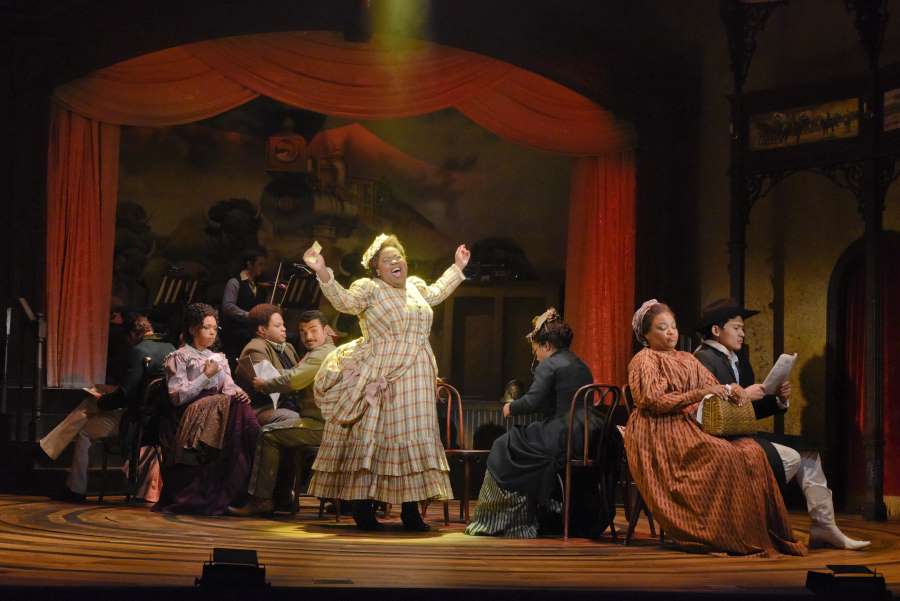
Once on the path of writing, musical-theatre makers often find their acting training very helpful. Pasek and Paul, who studied musical theatre at the University of Michigan, used spare time between playing bit parts in the school’s production of City of Angels to write Edges, a song cycle that became something of a sensation thanks to YouTube videos of a performance at the school. This season the duo has a musical on Broadway, Dear Evan Hansen (as well as a film, La La Land). It’s been quite a ride, but all along, they said, their acting training stood them in good stead.
“When we began writing songs, we reversed what we learned in our acting classes,” explains Pasek. “They would ask us: ‘Who are you talking to? What’s your objective? What obstacles are in your way?’ And then we thought, if we were writing these songs for our fellow acting students, what would they need to put those songs onstage?”
Gwon also studied acting at New York University’s Tisch School of the Arts. During a class break one day, he started fiddling on the piano in the next room; his teacher David Bucknam came up to him and asked if he had been playing.
“I was kind of a shy kid, and he pulled me aside and said, ‘I felt more of who you are as a person while you were playing piano than I’ve seen in class,’ and that was the first trigger where I realized it was something I felt like I was suited for,” says Gwon.
Bucknam, who was also a composer, died during Gwon’s freshman year, which only further spurred him on. While he continued in the school’s acting track, Gwon looked for every opportunity to learn the writing craft. NYU doesn’t allow students to audition for productions their first year, so Gwon began music-directing student shows and composing incidental music for plays. The school also has a graduate program in musical theatre writing, and Gwon would perform songs for students in their classes, dropping in to observe some days.
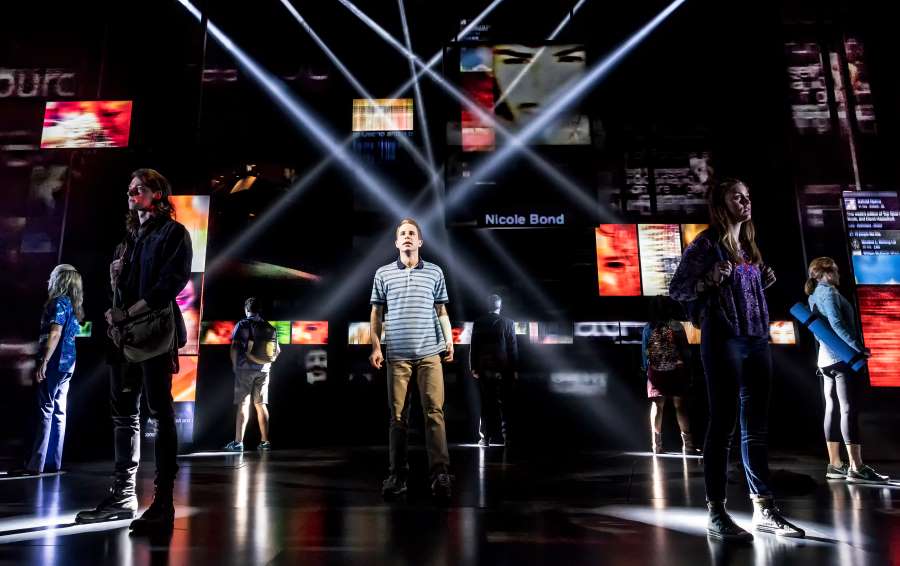
Pasek and Paul also found ways to alter their training at Michigan to suit their strengths; some teachers even created independent-study opportunities for the emerging writers to learn.
“My teacher, Jerry DePuit, would take old classic musical theatre songs, and he would sit me down at the piano and basically say, ‘Let’s create a new arrangement of the song,’” Paul says.
Adds Pasek, “Brent Wagner designed a class where he would give me songs written by classic composers that were not that well known, and I would write lyrics to the songs.”
The two also looked outside the school for opportunities in training and mentorship. They contacted a fellow Michigan alum, composer/lyricist Jeff Marx, via Friendster, and ended up shadowing him over the summer while he mounted Avenue Q in Las Vegas. (Marx also introduced them to their first agent.) They also took chances and sought advice from writers who seemed out of reach at the time.
“I met Stephen Schwartz at an event when we were still in college and gave him our CD of Edges,” says Paul. “After months and months of figuring we’d never hear from him, he sent us this pages-long email addressing every single song. There’s such a generosity of spirit among writers like that in passing it along.”
Gwon, meanwhile, found a champion and mentor in Lynn Ahrens when he signed up for a workshop through the now-defunct Musical Theater Works. The workshop offered writers the opportunity to play their songs for different working professionals, and Ahrens heard something in Gwon’s music.
“As I was leaving at the end of class, Lynn Ahrens somewhat violently grabbed my arm and said, ‘Give me your phone number,’” Gwon recalls, adding that Ahrens called and began introducing him to the world of musical theatre writing. She also invited him to join the Dramatists Guild Fellowship program, which she ran with her collaborator, the composer Stephen Flaherty, at the time. The fellowship for playwrights, composers, and lyricists consists of weekly meetings for writers to share work with each other and opportunities to observe on professional productions. Each fellow is also paired with a mentor. Gwon wrote his show Ordinary Days while in the fellowship.
“It really does seem like this idea of mentorship is a huge part of the musical theatre community,” Gwon says. “So many of those people feel this responsibility to mentor the next generation and usher them into the fold.”
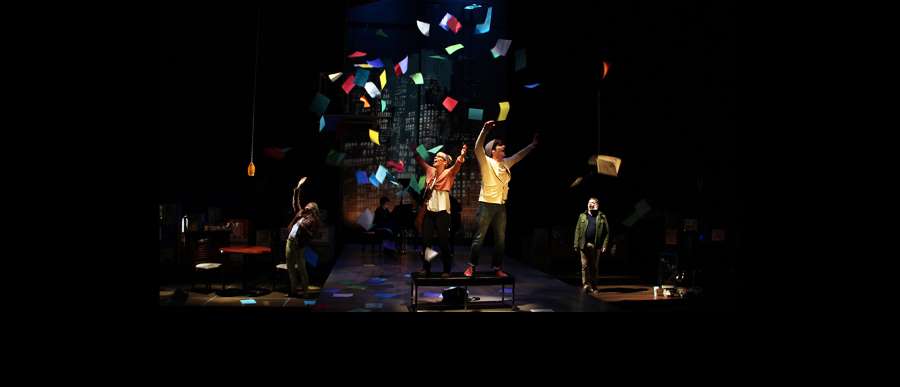
For lyricist/playwright/book writer Nell Benjamin, Harold Prince was that person for her, in a way. She and her husband, the composer Larry O’Keefe (Bat Boy) were asked to write a musical as part of an evening of three short musicals that Prince was involved in. It was Benjamin’s first musical job outside of college. Though Prince was directing only one of the shows, he gave feedback on all of them.
“Nothing will give you a quicker musical theatre education than presenting your first draft to Hal Prince,” says Benjamin, who wrote The Mice about an adulterous exterminator in a suicide pact, along with O’Keefe and playwright Julia Jordan. “I remember the experience of presenting one of the songs we were reasonably proud of, and he just flipped that thing over like an animal and found the weak point in the belly of it and was like, ‘Yeah, what are you going to do about this?’” says Benjamin, adding that he was “always a gentleman,” no matter how critical. “That man knows what a song needs to do.”
For many writers, the first stop on their road is the BMI Lehman Engel Musical Theatre Workshop. Ahrens and Flaherty actually met through this program, as did many, many other writers (from Kristen Anderson-Lopez and Robert Lopez to Howard Ashman and Alan Menken and countless others). Gwon was accepted into the program the same year as the Dramatists Guild and had to choose between them, since both met on the same night. Pasek participated in the first year of the three-year workshop. During that initial year, lyricists and composers pair up with different collaborators for song assignments, from writing a song for Blanche Du Bois to musicalizing the climactic suicide in Death of a Salesman. In the second year, students team up with one collaborator from the program to work on a full musical and present four songs from the show at the end of the year, at which point the BMI committee decides whether to invite them to continue into the third year and beyond. (It’s not a competition—all could conceivably be invited.) At the advanced level, students present new work to the room for feedback on a weekly basis. More than 300 people apply each year; about 35 are accepted.
“We don’t tell people what to write or how to write or what style to write in, but we do talk about the craft of musical theatre,” says the program’s director, Pat Cook. Cook adds that one of the key components of musical theatre writing is to teach collaboration. “It’s like teaching a marriage,” he says. “All you can do is be a consultant or be a therapist. I think marriage therapists would be very much at home with songwriters, because it carries the same emotional problems.”
Childs also says that collaboration was one of the most important skills she learned in NYU’s graduate musical theatre writing program. “Understanding that everybody has a voice—and many people have very strong voices—how do you meld those voices together to make this work of art?” she says, adding that she tries to pass that knowledge down to her students as she teaches in the program now. “And sometimes it’s really difficult, but it’s always worth it.”
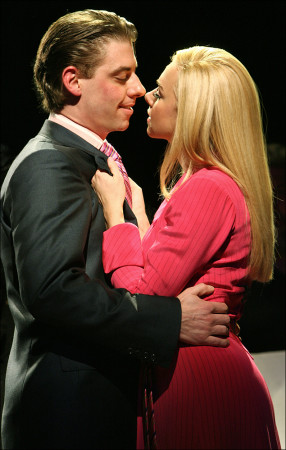
Sometimes actual marriage and relationships are part of the equation. Benjamin met her husband, O’Keefe, at Harvard, and they have both worked together on shows (Legally Blonde) and apart (in an ironic twist, O’Keefe cowrote Heathers: The Musical and Benjamin is penning the lyrics for Mean Girls: The Musical).
“I probably learned the most about good musical theatre writing from my husband, who I believe to be a genius, and watching his process and working with him was just huge,” says Benjamin, adding that absorbing other artists’ work was formative for her as well. “We just listened to what other people were doing really. I listened to a lot of Sondheim. From Lin-Manuel on down, we all listen to a lot of Sondheim. You listen to things and you think, ‘God, I’ll never be able to do that,’ and try to work your way up.”
For Stew, listening to the greats and immersing himself in music of all types was his training. While he never gravitated toward musical theatre, he too has a Sondheim pedigree: He purchased the Company cast album when he was 18.
“I had really good teachers: Bob Dylan, Stevie Wonder, Marvin Gaye,” says Stew. “That’s, to me, how you learn. I teach songwriting, but I don’t really teach it. I just point. I guide. I don’t teach anything specifically about songwriting, except that people need to listen to amazing songs and know why the songs are amazing.”
He can recall one teacher in particular who steered him on the right path. When he bought a guitar at age 13 or 14 because he was joining a band in Los Angeles, he started taking guitar lessons from one of the store’s teachers.
“He was really, really formative for me,” recalls Stew, who says he would often shun the teacher’s emphasis on scales and focus more on learning the guitar riffs in rock songs. “His approach was to go directly to the music. He knew I didn’t want to be a classical guitarist. He identified that in me. He recognized my passion.”
When Stew moved to New York in his early 20s, he made a point to immerse himself in the music scene, going out almost every night and watching all forms of live music, from salsa to instrumental jazz to hip-hop.
“Funnily enough, one thing we didn’t do was musical theatre, because the price was a bit prohibitive,” he says. “We’d walk through the theatre district, and I’d go, ‘Wow, I wonder what goes on in there.’ I’m still wondering, actually!”
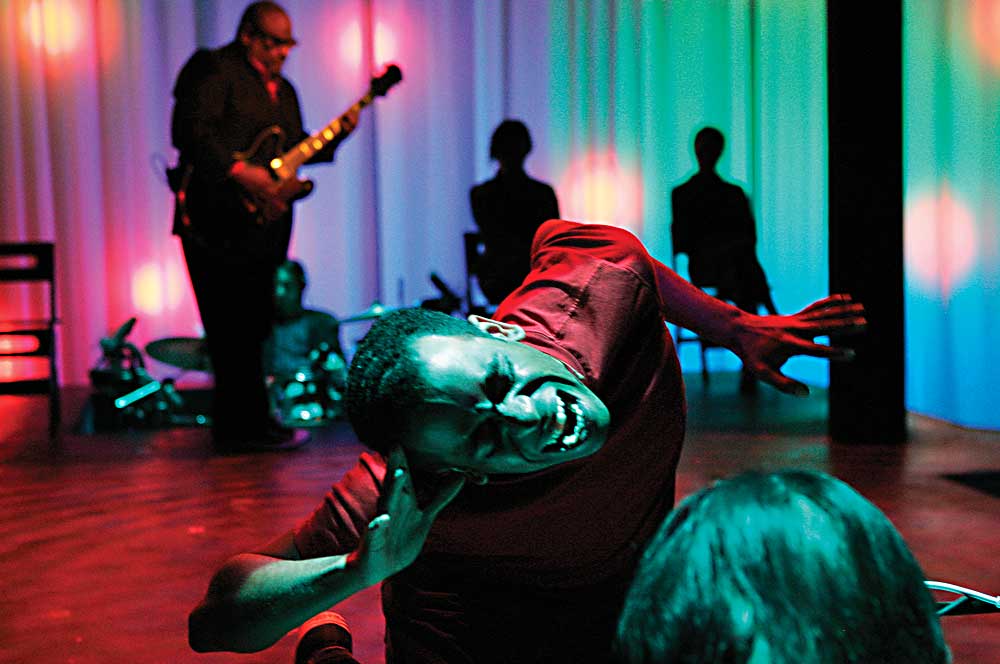
For Stew, theatre is just an extension of performing concerts with his band, Stew & the Negro Problem, which he leads with his songwriting partner, Heidi Rodewald. In fact he’s always structured his theatrical efforts somewhat like concerts. When folks at the Public Theater in NYC first asked him to write the musical that would become Passing Strange, he turned down the opportunity three times; his main worry was that he would need to change his sound to write for the stage. He overcame that hesitation, though, and with Rodewald “just started—no rules, no books. All we knew was that people talked and then played songs. For us, the concert form is theatrical. Music is a branch of theatre, because there’s somebody onstage telling a story. I feel like I’ve been making theatre all my life—I was just making it in a rock club.”
Del Aguila also used the concert form to shape the book for his first musical, Altar Boyz. Del Aguila got offered the job after a producer saw a collection of his one-acts at the New York Fringe Festival.
“Altar Boyz really taught me the basics of what you need in a musical book,” Del Aguila says. “Because it was a concert, you couldn’t have any private scenes between characters. And since it’s a concert, the songs didn’t really progress the plot, so it really taught me to put things in context.”
Even with a more traditional musical, in which the songs advance the story, the “sign of a good book,” he says, is that “you can’t really see it, and the emphasis is on the music. If you’re noticing the book, then it’s not staying true to the musical idea that people break into song when their emotions are so high that they can do nothing else.”
Benjamin agrees: “Nobody notices a great book of a musical. Sweeney Todd has about one of the sharpest, quickest books ever imagined, and you don’t think of it that way.”
Benjamin’s greatest training ground in writing books for musicals was working in Ron Leavitt’s writing room on the TV show “Unhappily Ever After,” a spinoff of Leavitt’s show “Married With Children.”
“We would just pitch to him, and if he liked it, he laughed and wrote it down; and if he didn’t like it, we kept going,” she says. “To me that was the biggest skill to learn in book writing. You’re basically just trying to get the plot going. If it can be cut, it must be cut.”
Both Benjamin and Del Aguila have also written musicals for young audiences as part of TheatreWorks USA. Del Aguila began his career as an actor there and eventually started writing such adaptations as Click Clack Moo and Skippyjon Jones. For Benjamin, who wrote lyrics for a version of Sarah Plain and Tall with O’Keefe and Jordan, the experience was most valuable because of the audiences.
“Children are the best audiences to tell you whether you’re actually communicating with an audience correctly,” she explains. “If you have a reading in front of theatre people and if they don’t like it, they still sit quietly, but kids just start hitting each other. If you are boring them, you will know it.”
Indeed, once writers have learned the craft from study and practice, the best teachers may be the ones in the theatre seats.
“Listen to audiences, who give you the best feedback possible,” says Paul. “Take any chance you can to put your work in front of people. I think the only way to really get better and to improve is to just keep writing and to keep learning from your mistakes.”


